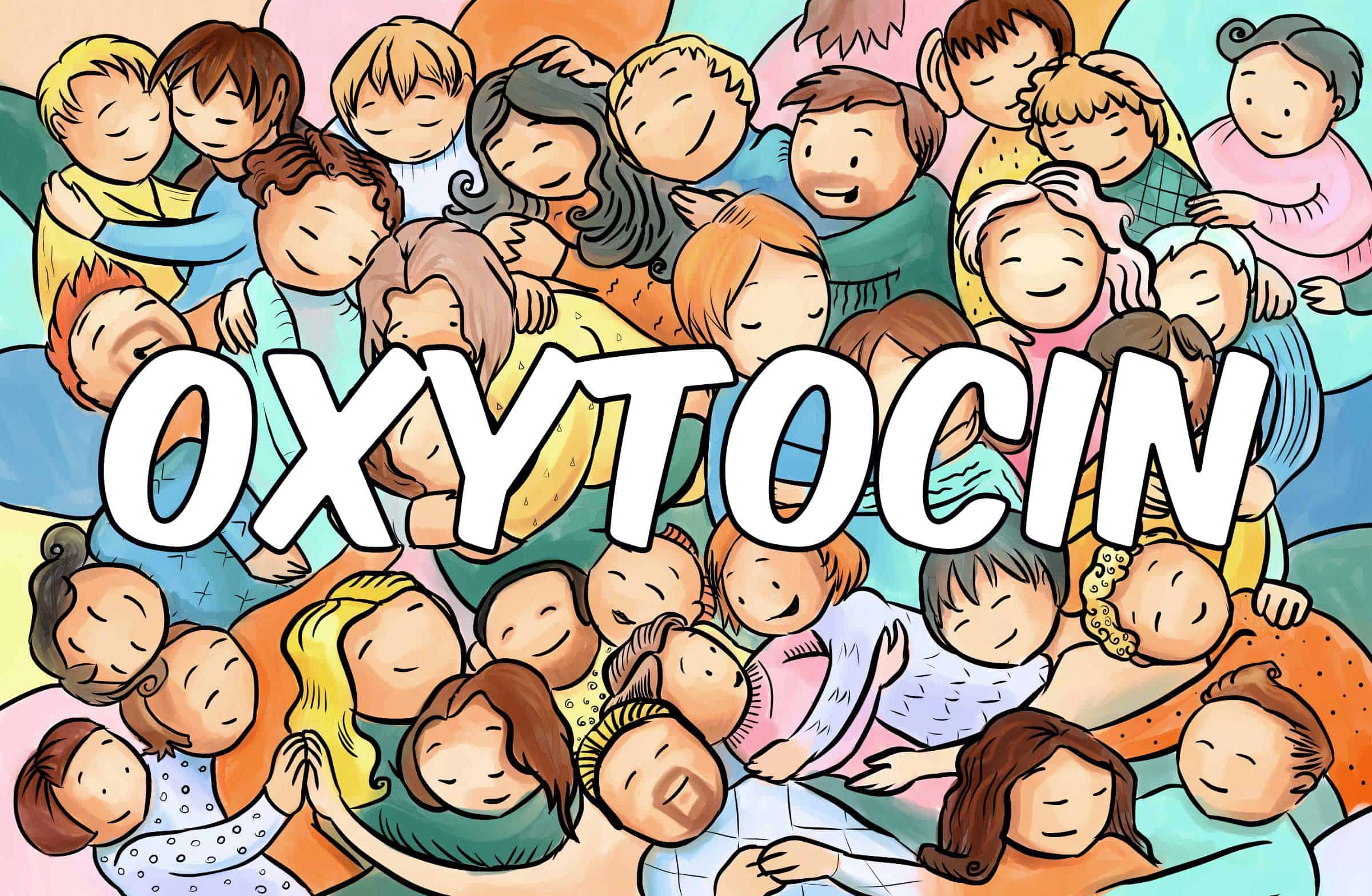
Have you ever felt like there was an invisible bond between you and someone else? Dr. Eric Stowler, a physician who has served the community for over fifteen years, might have the answer: Oxytocin! (No, not oxycontin! That’s a whole different article).
He explains how “This remarkable chemical messenger enhances social behavior and connections. It’s integral to understanding our relationships with others and is even linked to wellbeing!”
Often called the “love hormone” oxytocin is a hormone and neurotransmitter that plays an important role in regulating emotion, social interaction, and stress.
In this article, we’ll explore the effects of oxytocin on the body and how it’s connected to physical and mental health. We’ll also discuss Dr. Stowler’s thoughts on why it’s so important for us to understand oxytocin better.
Let’s get started!
Introduction to Oxytocin: What is it and why is it important?
Oxytocin (otherwise known as OXT) is one of the most studied peptide hormones in the human body. It’s produced primarily by the hypothalamus in both men and women, but it can also be found in other areas of the body.
This hormone plays an important role in a variety of different physiological processes, including childbirth, lactation, sexual response, and social bonding.
It’s often referred to as:
- The Cuddle Hormone
- The Love Hormone
- The Trust Hormone
- The Bonding Hormone
- The Social Attachment Hormone
- The Moral Molecule
Oxytocin has been linked to improved mental health in numerous studies. One study from 2017 showed that oxytocin supplementation helped reduce depression symptoms in people with major depressive disorder (MDD).
Another recent article looked at how oxytocin could reduce stress responses to negative life events and help people manage emotions more effectively.
Moreover, oxytocin impacts many aspects of human behavior such as trust, empathy and prosocial behaviors. For example, research suggests that increasing levels of oxytocin may improve relationships by encouraging cooperation between partners.
On the flip side though, high levels of oxytocin may have negative effects like promoting envy or distrust among members of a group or fostering a sense of entitlement to rewards over teamwork and sharing.
Though this hormone has only recently begun gaining recognition for its impact on our emotional health and wellbeing. It’s already become quite clear that understanding how it works holds enormous potential for improving lives everywhere. Which is why Dr. Stowler has devoted a lot of his time to studying and understanding its effects.
The Technical Stuff: Neurophysiological Properties of Oxytocin
Oxytocin is produced and released into the bloodstream by different parts of the brain after stimulation.
It has a variety of effects on the body, but its main functions are to stimulate labor in pregnant women, increase milk production in lactating mothers and affect social behavior.
As Dr. Stowler explains, “When released from neurons in specific areas of the brain that control emotion, oxytocin acts on receptors present throughout the brain to influence positive interactions between people”.
Oxytocin travels throughout the central nervous system and binds to various types of receptors, stimulating certain emotions such as trust or empathy towards others.
In addition to influencing emotional responses, oxytocin also affects physiological processes. For example, it can increase heart rate variability which can be beneficial during times of stress or fatigue. Allowing for better regulation over homeostasis within our bodies.
Furthermore, it’s been shown to modulate pain signals coming from different regions and organs. Indicating that it may have a role in managing chronic pain conditions as well.
Role in Human Relationships
How oxytocin affects our emotions and relationships with others is something that has long been studied.
Studies have found oxytocin to be a key factor in forming relationships, allowing us to better connect with others and build strong bonds.
When released during physical contact such as hugs or handshakes, it increases our feelings of closeness and comfort towards those around us. It also helps reduce anxiety levels which can make social situations more enjoyable and free from stress.
The impact of oxytocin goes beyond emotional connections though. It has shown to help strengthen the bond between two people on a physiological level too. This can lead to greater empathy, understanding and mutual respect within these relationships which is beneficial for them in the long run.
“Oxytocin is an essential hormone when it comes to human interaction and social behavior, playing an important role in our lives,” says Dr. Stowler.
Not only does it influence how we feel about each other but can also affect how we behave towards one another. Highlighting the importance of this hormone for successful interpersonal relations.
Why It’s Important for Romantic Relationships
Dr. Stowler believes that understanding Oxytocin can help us understand how relationships work and why they can be successful in the long run.
“Oxytocin is an incredibly important hormone when it comes to understanding how we build trust and form attachments with our significant others,” he says. “It’s a key factor in creating a sense of closeness between partners.”
Research has found that increasing oxytocin levels through things like physical touch can lead to more intimate relationships as well as greater feelings of satisfaction within those partnerships.
Higher oxytocin levels have been shown to reduce romantic jealousy, too!
Other scientific research has demonstrated that increased oxytocin levels are associated with improved relationship stability over time.
As Dr. Stowler explains: “By having higher amounts of oxytocin circulating in our body systems, couples may find themselves feeling closer to one another and experiencing fewer conflict-related issues than those with lower concentrations.”
So while it might not be immediately clear why understanding Oxytocin is so beneficial for individuals wanting to strengthen their current relationships or form new ones, Dr. Stowler sees it quite simply this way: “Oxytocin is what creates healthy relationships. Both in terms of physical health but also in terms of psychological wellbeing,” he says.
The Role Oxytocin Plays in Social Interaction
Oxytocin also plays an important role in how we interact with friends socially.
Studies have found that elevated oxytocin concentrations:
- Promote greater trust between individuals engaging in cooperative tasks
- Enhance bonding through facial expressions during communication activities
- Reduces fear responses when interacting with unfamiliar groups
- Improves empathy during stressful interaction situations
Research has spotted an interesting dialogue between neurotransmitters, such as dopamine and serotonin, teaming up with Oxytocin to create a sense of belongingness or connection when amongst people with similar backgrounds.
This ‘chemistry’ can even spill over into positive relationships with animals such as dogs. An area where further research may improve our understanding of social behavior patterns across species boundaries!
According to Dr. Stowler, “we crave connection, whether it be with other humans or animals as well. Something I believe is wired into our biology through chemistries like that of Oxytocin”.
Benefits of Oxytocin: How it Promotes Health & Well-Being
Oxytocin has a vast range of functions in the human body, from hormone regulation to social bonding.
In terms of heart health, oxytocin helps reduce blood pressure and may even be able to protect against heart attack and stroke.
It also works closely with stress hormones like cortisol. When oxytocin levels are depleted, cortisol is released into the bloodstream more quickly resulting in higher levels of stress.
Stable oxytocin levels have been shown to normalize cortisol levels and therefore help improve mood and reduce overall feelings of anxiety.
Oxytocin has also been found to have anti-inflammatory effects on the body which can help reduce chronic pain caused by various conditions such as arthritis or fibromyalgia.
It even seems to play a role in immune system functioning, helping keep pathogens at bay. Something it does through its influence on other hormones produced by the pituitary gland.
Another effect oxytocin has on our bodies is its influence over reproductive functions. From childbirth where it promotes contractions in the uterus, ultimately encouraging successful pregnancies. Through lactation where it causes milk ejection (let down). Right up until menopause where it sustains healthy hormonal balance essential for optimal feminine health later in life.
“As you can see,” remarks Dr. Stowler, “it’s incredibly powerful stuff!”
How to Increase Your OXT Levels
Hugs are a great way to increase oxytocin levels and they’re free! Dr. Stowler says, “Research shows that hugging someone for at least 20 seconds increases the levels of oxytocin in our bodies.”
Moreover, mindfulness practices such as meditation, yoga and deep breathing can also stimulate oxytocin production. It has been shown that these activities create a sense of connectedness with ourselves and others. An important factor for increasing oxytocin release.
Dr. Stowler suggests taking some time out from your busy day-to-day life to get into these activities: “The benefits of being mindful – slower heart rate, lower blood pressure, decreased subjective stress – make it worth the effort,” he says.
Studies also suggest that omega-3 fatty acid intake is related to higher oxytocin levels, as well as vitamin D supplementation.
Dr. Stowler believes this association may be linked to their higher prevalence in fish and shellfish. “Omega-3s and Vitamin D are two essential components of the human diet,” he says.
“Fish, especially cold-water varieties like salmon, contain high levels of both these nutrients which might be why they increase oxytocin production.”
In addition to nutrition, physical activity also plays a role in increasing oxytocin production. Exercise has been shown to stimulate multiple hormones in the body including endorphins, serotonin and dopamine. All of which have an impact on social behavior, stress regulation and mood disorders.
Dr. Stowler suggests exercising for at least 30 minutes several times a week for optimal benefits. He explains: “Regular exercise helps the body release increased amounts of hormones like oxytocin that support feelings of calmness and wellbeing.”
Risks Associated with Oxytocin Overproduction or Deficiency
Overproduction or deficiency of oxytocin can have a number of long-term health risks. These include an increased risk for depression, anxiety and stress disorders.
Dr. Stowler explains the effects that an imbalance of hormones can have on our mental health: “The hypothalamus is responsible for releasing hormones like oxytocin, serotonin and dopamine which help regulate mood states like happiness or fear.” “If these hormones become unbalanced in any way, it could lead to abnormal psychological reactions,” he says.
Conversely, too much oxytocin has been linked to behavioral changes such as aggression and impulsivity. Both of which may be signs of psychological distress.
To avoid this outcome, Dr. Stowler suggests you balance your hormone level by eating a healthy diet and exercising regularly. He adds: “Overall wellness plays a major role in keeping your hormonal system functioning properly.”
Can You Measure Your OXT Levels?
“Yes and no,” says Dr. Stowler. “While there are methods for measuring your oxytocin levels, it requires specialized laboratory equipment with expertise in hormone analysis”, he says.
He recommends that people find more accessible ways to measure their oxytocin levels by assessing how they feel and behave.
“Your daily life offers you the best insight into your oxytocin balance,” says Dr. Stowler. “Emotional wellbeing, trust in relationships, and overall sense of connection are all signals that can clue us in on changes in our oxytocin level.”
Signs your oxytocin may be too low include feeling lonely, disconnected, and isolated.
Alternatively, signs of too much oxytocin may include poor boundaries in relationships and excessive attachment to another person or situation.





